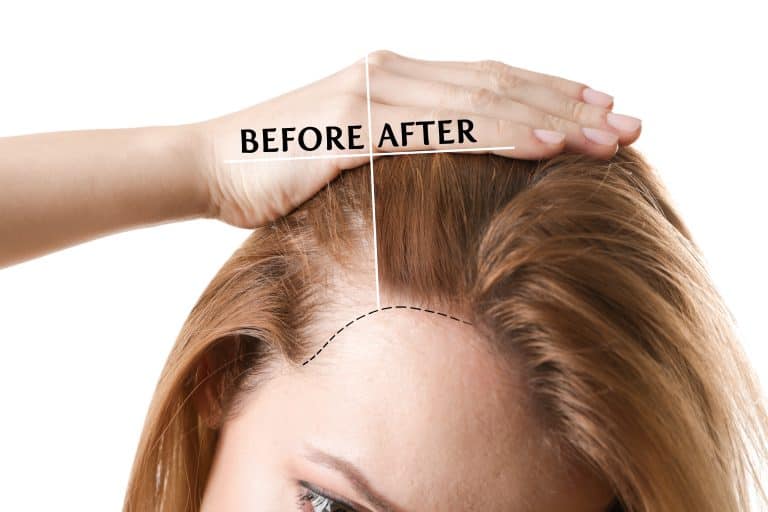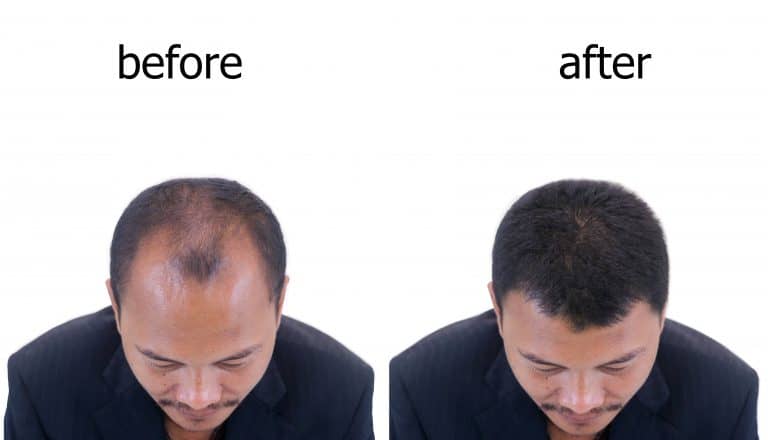Lupus Hair Loss
Lupus is a chronic autoimmune disease in which the body’s own immune system attacks healthy tissues. The condition affects about 1.5 million people and tends to strike women during their childbearing years.
Symptoms
Lupus often causes extreme fatigue, headaches, oral ulcers, and painful, swollen joints. Many people develop a butterfly-shaped rash across the bridge of the nose and become more sensitive to the sun. Other symptoms include fever; swelling in the feet and hands and around the eyes; chest pain; and anemia. Many people also experience hair loss, which may be mild and occur while shampooing or brushing your hair—or it may be more severe, coming out in patches and accompanied by a rash on the scalp, says Arthur Weinstein, MD, director of the division of rheumatology at the Washington Hospital Center. Because these symptoms occur in many other conditions, lupus is often called the great imitator.
The tests:
A rheumatologist will examine joints and other tissues for signs of inflammation, such as heat, pain, swelling, and redness. A blood test to measure levels of anti-nuclear antibodies (ANA) may also indicate lupus. Rheumatologists will also determine if patients have four of 11 diagnostic criteria set by the American College of Rheumatology, though fewer criteria along with a skin biopsy may sometimes indicate lupus, Dr. Weinstein says.
What you can do:
See a rheumatologist if your hair loss is accompanied by joint pain, fatigue, and other symptoms of lupus, which is treated with oral medications such as prednisone. If you also have a rash on the scalp, you need to see a dermatologist, who is likely to prescribe a topical cream.
Can lupus cause hair loss?
Unfortunately yes, Lupus causes widespread inflammation that usually involves your skin — particularly on your face and scalp. Lupus can cause the hair on your scalp to gradually thin out, although a few people lose clumps of hair. Loss of eyebrow, eyelash, beard and body hair also is possible.
In most Lupus Hair Loss cases, your hair will grow back when your lupus is treated. But some people with Lupus Hair Loss develop round (discoid) lesions on the scalp. Because these discoid lesions scar your hair follicles, they do cause permanent hair loss.
Lupus can also cause the scalp hair along your hairline to become fragile and break off easily, leaving you with a ragged appearance known as lupus hair.
Lupus Hair Loss may be an early sign of lupus, before the disease is diagnosed. But many other disorders can cause hair loss, so consult with your doctor if you notice unusual hair thinning or hair loss.
Most people don’t even notice the 50 to 100 strands of hair that they usually lose every day. With systemic lupus, the situation can be very different, with the loss of hair much more dramatic and noticeable.
Lupus hair loss can be caused by the disease itself, as the immune system destroys hair follicles, or by medicines such as prednisone and immune system-suppressants—in which case hair loss often stops once the medicine is stopped.
Hair may fall out in strands, or in clumps with the slightest pull, and sometimes it just thins out and gets very fragile and breakable.
If you are among the half of all people with systemic lupus who struggles with Lupus Hair Loss problem, here are some ideas about what you can do about it:
Action steps
- Losing hair can be scary, but it’s usually treatable and often can be covered up. It may take a while for hair to grow back—sometimes 6 months or more—but eventually it usually does unless it’s caused by skin (“cutaneous”) lupus that leads to a “discoid rash.” (Patches of thick and scaly red “discoid” rash can scar hair follicles and cause lasting hair loss, so be sure to talk to your doctor about your options if these develop. “Alopecia” is the medical term for hair loss.)
For most hair loss, you aren’t powerless! Here are some strategies to try:
- Refresh your hair style. Ask Guci Image for help to cover up bald spots.
- Consider Hair Extensions or one of Guci Images many “Non-Surgical” Solutions. If you still have some healthy hair and are just missing some patches on the sides (not the top)—and aren’t actively losing hair—consider Hair Extensions, Micro-Grafting or any other of Guci’s hair loss technologies that fit your individual needs. It is best to avoid contact with chemicals, adhesives (glues) and heat. Guci Image is a leader and expert in the field of Cold-Fusion all natural hair extensions. NO GLUE, NO HEAT, NO DAMAGE! Visit our extensions page to see the very best options available.
- Try a wig. These days wigs are so well-made that most people can’t tell you have one on. You may well feel a lot better when you see what options Guci has for you!
- Last resort: cosmetic surgery. For extreme and permanent hair loss, stretching the remaining hair to cover what’s been lost may be an option, or even transplanting hair from another part of the scalp.
If you have lupus hair loss, do NOT experiment with over-the-counter hair loss treatments. Talk to your doctor about treatment options.
What’s NOT to blame for lupus hair loss?
While it’s only common sense to avoid harsh chemicals or even very tight braids that pull on your scalp, you can’t really blame “serious” hair loss on a lack of vitamins, washing your hair a lot, or using hair colorings or other common hair products. Some hair loss follows the pattern that your mother or father experienced as well, and is totally normal.
The right treatment for you
Whether you are you are looking for something Non-surgical or Surgical, we offer a hair restoration solution that fits you.

Laser Light Therapy

SmartGraft® Hair Transplant Surgery

Human Hair Lace Wigs

Human Hair Extensions




